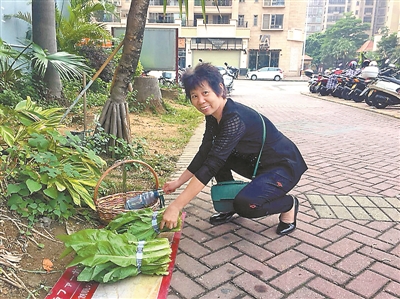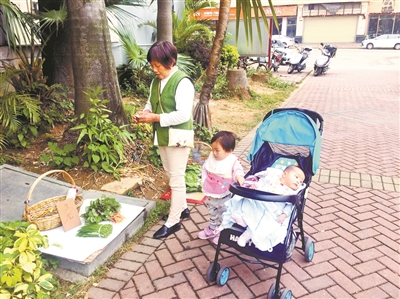



Guangdong positive energy
Text, map/Guangzhou Daily All-media reporter Wang Mingrun, Ceng Yi
At 6 o’clock in the morning yesterday, it was still not bright. Aunt Li Hong, who lives in the constellation of Jun ‘an Town, Shunde District, was busy in the vegetable field opposite the community. At 7 o’clock, seasonal vegetables such as oil wheat vegetables, sweet potato leaves, amaranth and leeks that have just been picked from vegetable fields are fresh "listed". The channel of vegetables "listing" is a bit special: a vegetable basket, a mineral water bottle with money and a priced card, leaving out the intermediate links and being left unattended. This is a well-known place in Jun ‘an and even Shunde, and it has persisted in "unmanned food stalls" for 8 years.
Interestingly, the "founder" of the food stall has moved out of the community, but the unmanned food stall has become more and more prosperous: from the first stall to the eight stalls at its peak, many residents nearby have become loyal fans of this unmanned food stall for eight years. Unmanned food stalls, all supported by the "integrity" of buyers, have successfully persisted for 8 years, and they have become more and more prosperous. What are the reasons for this? Our reporter conducted a verification visit.
Opening a stall in the mother-in-law’s family is rich
Ouyang Zugui, the property management manager, has worked in the community for nearly 10 years. According to him, the "unmanned food stall" was put on sale by an aunt in her 50 s eight years ago. She lives in this community with her son and daughter-in-law. Because her wife died and she was bored, she planted vegetables on this wasteland. Sometimes, it’s a pity to throw away all the vegetables, but I’m too busy taking care of my grandson to sell vegetables, so I came up with the idea of "selling vegetables by myself". Moreover, she can’t read, and the price of vegetables is written by her son. What makes people sigh is that this aunt’s family is very good, and her son’s business is doing well and filial piety. Selling vegetables is purely for finding something for himself, and serving the community residents.
Interestingly, the "founder" of the food stall has moved out of the community, but under her drive and influence, the "unmanned food stall" has become more and more prosperous. According to reports, when the "unmanned food stall" was at its peak, there were 8 "competing" at the same time. Yesterday, when the reporter came to the door of the community, he found that there were still three companies operating.
In 2009, Li Hong came to Jun ‘an with her children. "At that time, I came to take care of my children and was busy every day." She recalled. Once, on the way to send her grandson to school, she found several food stalls at the intersection of entering and leaving the community. To her surprise, no one sold the food stall. Li Hong inquired in many ways and found that it was an old resident in the community who opened up a small piece of wasteland opposite the community and planted vegetables. Almost at the same time, Aunt Kong Lan from Shaoguan moved in with her children, so they joined the "unmanned food stall" together.
In their words, "I always want to do something, do something. Growing vegetables is my old job, not to make money, but I think wasteland can’t be wasted." Aunt Li Hong said.
Did "theft by dishonesty" happen?
In recent years, some residents who run "unmanned food stalls" have joined and some have quit. "The people who grow vegetables here are retired residents, and some residents quit planting because they have to take care of their grandchildren." Li Hong said that growing vegetables is one of his pastimes. Every morning from 7: 00 to 12: 00 and from 16: 00 to 18: 00, the "unmanned food stall" will "open its doors for business" on time. Through this "unmanned" business model, you can save 7 hours a day and at least 2520 hours a year, equivalent to 105 days.
In Li Hong’s memory, during the soaring price of ginger a few years ago, someone once dug up the ginger in the vegetable field overnight. "But this is the only case in six or seven years." However, "unmanned food stalls" have also been "stolen". The so-called "theft", Li Hong explained, refers to the incident of unequal prices. "Sometimes, when the stall is closed, it is found that the food money is less; Sometimes, you will find more money. " Li Hong said that since the beginning of this year, there have been five "theft" incidents, and there were about 10 cases last year and the year before last. To this end, the reporter also calculated an economic account for her "unmanned food stall". Assuming that the stall sells 10 handfuls of vegetables every day, there are 10 "theft" cases in a year, accounting for only 0.27%, which is a small probability event.
Why has the unmanned food stall been successfully operated for 8 years?
"Good deeds drive good deeds, and kindness drives kindness."
What is the reason for the successful operation of Jun ‘an, an "unmanned food stall", for eight years? The reporter learned that the unmanned food stalls are placed outside the community, and many strangers patronize the community except for living outdoors. After the reporter’s investigation, one of the residents gave the best answer, "Good things drive good things, and kindness drives kindness".
There are four reasons for the successful operation of Jun ‘an unmanned food stall:
First, the "role model", the first aunt’s successful land reclamation and the successful operation of unmanned food stalls have promoted an atmosphere of "good deeds and honesty". Soon, two aunts, Li and Kong, followed suit, and the residents also cooperated, all trying to continue the good deeds;
Secondly, the "beautiful initial intention" of the aunt who grows vegetables, all the aunts who grow vegetables, are not for making money. Kong Lan said: "We can’t finish growing vegetables ourselves, so we want to give them to the residents." In aunt’s mind, it is not important to give money or not, but to share the fruits of labor is the happiest;
Thirdly, "respect for hard work", the unmanned food stall in Jun ‘an has a very big feature. The unmanned food stall is "on the left" and the aunts work "on the right". Many residents can see their aunts working hard when they buy food: the water is picked by themselves, the fields are plowed by themselves, and the insects are removed by themselves. Moreover, it is still a "sunny vegetable field". Aunties insist on using plant fertilizers instead of chemical fertilizers. Residents are all in the eyes. Resident Chen Ayi told reporters, "They have worked so hard to grow vegetables and only sold a lot of 3 yuan. How dare you buy food without giving money?"
Fourth, "the pride of honesty", the residents nearby are "proud" of this unmanned food stall, and think that their community is harmonious, so almost everyone is maintaining it, and some residents specially bring their children to buy food to give money, which is to let the children have a special "honesty lesson".
Expert: unmanned sales ultimately depend on the credit system.
The popularity of Jun ‘an "unmanned food stall" makes people see the light of honesty shining. Wu Jing, an associate professor at the School of Management of Jinan University, believes that the reason why unattended food stalls can persist for a long time is the embodiment of the honesty and trustworthiness of local residents. However, in her view, there are essential differences between the concepts of "unmanned food stalls" and the "unmanned supermarkets" that are emerging on the Internet. She believes that unmanned supermarkets rely more on modern scientific and technological means, with intelligence and intelligence as the means. Many places in Guangdong have begun to have layouts and pilots, while "unmanned food stalls" are more concerned with personal morality of honesty and trustworthiness.
Wu Jing believes that the unattended business mode relying on honest payment needs certain conditions, such as low commodity value, which is more suitable for closed systems or small-scale consumer groups. Once there are more people, a perfect credit system is needed to maintain business.